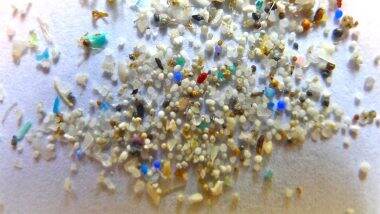When we think of pollutions, industrial effluents, noxious gases and plastics come to mind, not cosmetics. But here’s a stunning fact – certain cosmetic and personal care products are already posing a grave danger to the ecology and have been killing aquatic life by the droves. And the biggest offender in this list is facial scrubs. This personal care product is used by millions of men and women worldwide to exfoliate dead skin cells. Microbeads or microplastics are small, circular plastic beads inside the skin care product which helps slough off dead skin cells to reveal brighter-looking skin underneath.
The problem, however, is that these beads are not biodegradable and often interfere with marine life. These microscopic exfoliating beads don’t disappear with the foam when you use them. Since they are plastic, they stay intact and are washed into the ocean where they wreak havoc on marine life. But despite being such a serious source of marine pollution, their effects are rarely reported.
Researchers at the Plymouth University found that everyday face scrubs release 94,500 microbeads into the oceans. They are too small to be filtered out of the sewage systems. These plastic beads are then eaten by worms, who are then devoured by the other fish. These beads keep moving upward in the food chain and can finally end up inside humans.
A total of 80 tonnes of the beads are released every year with the use of such cosmetics. But scrubs are not the only cosmetics to contain these hazardous beads. Shaving creams, lotions, bubble baths and even toothpastes contain microbeads. Companies such as L’Oreal and Nivea have already stopped using the beads in their cosmetics. Switching to biodegradable scrubs such as sugar-based ones will help reduce the microbead load on the environment. You can also try other means of mechanical exfoliation like sponges and wash cloths.
(The above story first appeared on LatestLY on Jun 05, 2018 01:11 PM IST. For more news and updates on politics, world, sports, entertainment and lifestyle, log on to our website latestly.com).













 Quickly
Quickly


